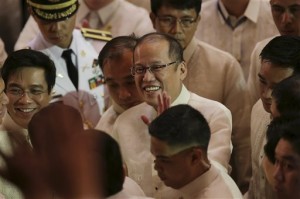
The 2016 presidential election season may have inadvertently come early for the Philippines, putting President Aquino’s remaining reform agenda at “serious” risk, according to New York-based think tank Global Source.
“At a time of slowing growth, rising inflation and visible signs of infrastructure constraints, an adjudged bend in the administration’s “daang matuwid (righteous path)” has left the President not only with reduced degrees of freedom to invigorate the economy but also dented his corruption-fighting image,” Global Source said in a report “A Bend in the Road” dated Aug. 6.
Global Source has scaled down its 2014 gross domestic product (GDP) growth forecast for the Philippines from 6.1 percent to 5.8 percent, lower than the market consensus forecast of 6.3 percent. For 2015, Global Source has likewise pared down its GDP forecast from 6.4 percent to 6.2 percent against the market consensus of 6.5 percent.
The report written by Filipino economists Romeo Bernardo and Marie Christine Tang also said that on the much-awaited structural reforms, while the administration continued to keep the rationalization of fiscal incentives in its priority legislative measures, there was not much hope that it would be passed by 2016 in the current political environment.
Global Source’s slower GDP growth forecast, on the other hand, factored in the likely “midyear hiccups” from a combination of cautious public spending, drags to production due to Manila’s truck ban and resulting port congestion, as well as some scrimping by households facing higher food prices.
While available indicators of economic activity suggested a quite robust second-quarter growth, Global Source said a number of accompanying bad news were hard to ignore.
“Inadequate rice and other basic food supplies as well as pressure on oil prices following the turbulence in the Middle East raised domestic consumer prices. Manila’s truck ban, imposed end-February and resolved by a compromise 24-hour truck lane in June, had by then taken its toll not only on logistics costs but more importantly, on trading activity that still lingers as the resulting port congestion led to significant delays in sending out exports and releasing imports,” the report said.
The problem was compounded by a stricter enforcement of rules against unfranchised truck operations and new Bureau of Customs rules, Global Source said, citing latest import statistics showing an almost 10-percent drop in May imports, which it said might be a reflection of this bottleneck alongside an increased clampdown on smuggling.
“There were also reminders along the way of the economy’s vulnerability to breakdowns in any of the major power plants, with the energy secretary now urging the President to seek emergency powers to deal with foreseen shortages by the summer of 2015. Moreover, the latest court ruling on the illegality of the administration’s Disbursement Acceleration Program (DAP) puts in question the government’s ability to meet spending targets for the year,” the research said.
Considering that Mr. Aquino was elected on a platform of good governance and had kept his image “squeaky clean,” Global Source said it was understandable that the President would take offense at a judgment from the Supreme Court presuming bad faith on the DAP. Hence, the report said it was important for Malacañang to file its motion for reconsideration if only to remove this obiter to the main decision that, if left unchallenged, could indeed have a “chilling effect” on all future action of the executive department.
“Moreover, it was important for the President to sharply draw the distinction in the mind of the public between an arguable constitutional issue like the DAP and plunder and graft cases for ghost projects, which three senators and several other officials have been charged with. With these moves, he is able to retain the moral high ground under the “daang matuwid” slogan and halt a further drop in his popularity ratings,” the research said.
Global Source said it was not clear that the President’s falling satisfaction, trust and performance scores were due to the DAP rulings, noting that the survey dates had ended either a day before or a day after the ruling came out. “There were a lot of things happening in the run-up to the surveys, most notably the arrest of the three opposition senators, which opened the administration to criticisms of only going after the enemies among the over 100 names tagged in the scandal. That particular period was also a time of rising food prices, rice being the most sensitive item,” it said.
As such, Global Source said data suggested that rising inflation might be the “bigger culprit” for the President’s poorer scores.
“Hopefully, efforts to stabilize inflation and the widely seen as favorable State of the Nation Address (Sona) of the President will hold the line on his ratings. In any event, the scores now still compare most favorably versus his predecessors past mid-term, where the pattern has been predictably south,” the research said.

